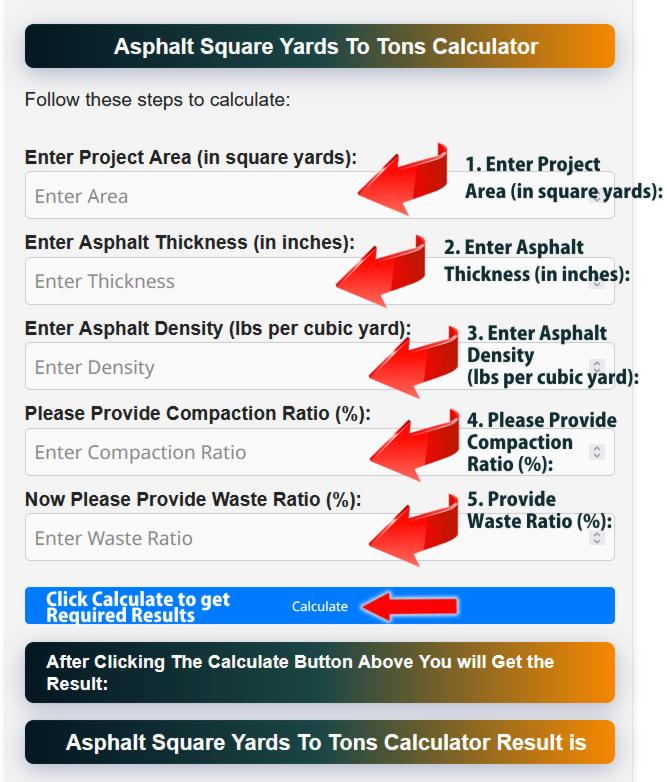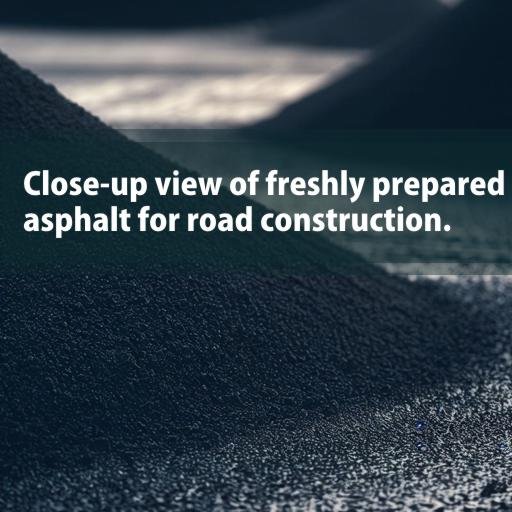[asphalt_square_yards_to_tons_calculator]
About Square Yards to Tons Calculation
Often abbreviated as sq.m. or M2, a square meter is a unit that measures area. It is the equivalent of a square with each side measuring one meter. Based on this measurement, approximately 12 square meters would be required to accommodate a typical car in a parking space.
When evaluating a construction property size, it’s important to remember that the size corresponds to the square of the linear measurement. Therefore, if the linear measurements are increased by twice, the size becomes four times greater.
Square meters; a unit of measurement for the area, are generally not considered when assessing the length or distance in a single direction. This is the exact reason why square meters can be transformed into square feet. For instance, one square meter equals 10.76 square feet. However, it’s not possible to turn a square meter, otherwise known as a meter squared, into feet. Yet, when translating from square meters to other units of area like square inches or square miles, the conversion factor for the linear unit must be doubled, assuming the conversion has to take place.
The formula for the Square Yards To Tons Calculator is Area
Tons of Asphalt=12×2000Area (in square feet)×Thickness (in inches)
Where:
“Area” is the total area to be paved in square feet.
Thickness” is the desired thickness of the asphalt layer in inches (e.g., 2 inches, 3 inches, etc.).
12 is used to convert the thickness from inches to feet.
2000 is a constant representing the average weight of asphalt in pounds per cubic yard.
Asphalt Square Yards To Tons Calculator
Asphalt, a composite material akin to concrete, is essential for constructing roads, driveways, and more. The key to a successful project lies in accurate asphalt calculations. This guide unveils the step-by-step process to determine the exact asphalt tonnage required, ensuring cost-efficiency and top-notch results.
Key Takeaways in this asphalt square yards to tons guide: Mastering asphalt calculations is crucial for construction excellence, ensuring optimal project outcomes, cost savings, and efficient execution.
Facts About Asphalt:
- Asphalt is a composite material similar to concrete.
- It’s used extensively in road construction, driveways, and more.
- Bitumen, a black viscous liquid, acts as the binding agent in asphalt.
- The U.S. predominantly uses hot mix asphalt for paving, known as Blacktop.
- The weight of one cubic yard of hot mix asphalt is approximately 2,025 tons or 4,050 pounds.
Imagine laying down a road without proper measurements. Not only would this lead to a potential waste of resources, but the longevity and quality of the road would also be compromised. This is where the art of asphalt calculations comes into play.
Every professional in the construction industry understands the importance of accurate measurements. It’s not just about knowing how much material is needed, but also understanding the nuances of different asphalt types, their densities, and how they interact with various surfaces.
The process begins with meticulous on-site measurements. Every inch counts. Once the area’s dimensions are noted, the next step involves conversions. While this might sound straightforward, even a minor miscalculation can lead to significant discrepancies in the final output.
But measurements are just the beginning. The type of asphalt, its density, and even external factors like temperature can influence the final result. Hence, professionals often liaise with asphalt suppliers to get an accurate understanding of the material’s weight density.
The culmination of this process is the final calculation, determining the exact tonnage of asphalt required. This not only ensures that the right amount of material is procured, but it also aids in budgeting and project planning.
Are you planning an asphalt project and need to determine the quantity of asphalt required? Our Asphalt Square Yards To Tons Calculator is here to help. Follow these simple steps to get accurate calculations:

- Project Area (in square yards):
- Enter the total project area in square yards. This is the space where you’ll be applying asphalt.
- Asphalt Thickness (in inches):
- Input the desired asphalt thickness in inches. Common thicknesses range from 1 to 4 inches.
- Asphalt Density (lbs per cubic yard):
- Specify the density of the asphalt in pounds per cubic yard. This helps calculate the weight of the material.
- Compaction Ratio (%):
- Enter the compaction ratio as a percentage. This accounts for the reduction in volume due to compaction during installation.
- Waste Ratio (%):
- Input the waste ratio as a percentage. This factor allows for material loss and irregular areas.
- Click Calculate:
- Hit the “Calculate” button to instantly generate the total tons of asphalt required for your project.


Our calculator also considers asphalt type, actual density, and other factors behind the scenes to provide precise results. Whether it’s a small repair or a large paving project, our tool simplifies the process and ensures accurate estimates.
| Guide | Description |
|---|---|
| Bitumen | A black viscous liquid that acts as the binding agent in asphalt. |
| Hot Mix Asphalt | A common type of asphalt used in the U.S. for paving. |
| Weight Density | A measure that varies based on the specific type of asphalt, determining its weight. |
| Cubic Yard | A unit of measurement, with one cubic yard of hot mix asphalt weighing approximately 2,025 tons. |
| Asphalt Millings | Reclaimed asphalt pavement weighing around 3240 to 3780 pounds per yard. |
Why is Bitumen Essential in Asphalt? Bitumen, with its viscous nature, acts as the glue holding the asphalt together, ensuring durability and longevity.

How Do Professionals Ensure Accurate Asphalt Measurements? Accuracy is achieved through meticulous on-site measurements, conversions, and liaising with suppliers for weight density details.
What’s the Significance of Weight Density in Asphalt Calculations? Weight density determines the amount of asphalt required. Different asphalt types have varying densities, influencing the final tonnage.
Use this calculator to plan your asphalt projects with confidence and efficiency.
Best Asphalt Square Yards To Tons Calculator
When it comes to construction and roadwork, accuracy is paramount. One of the most crucial aspects of these projects is determining the amount of material required. This is where the Asphalt Square Yards to Tons Calculator comes into play. This tool is a game-changer for professionals in the industry, ensuring precise measurements and optimal results.
How to get the most accurate Asphalt Calculations?
Measurements: The First Step to Perfection
Every construction project begins with accurate measurements. In the realm of asphalt paving, this step is paramount. The dimensions of the area to be paved – its length, height, and depth – dictate the amount of asphalt required. Using tools like tape measurers and measuring wheels, professionals meticulously gauge the site. A minor oversight or miscalculation at this stage can lead to significant repercussions later, from wasted resources to compromised road quality. Hence, ensuring precision in measurements sets the foundation for a successful asphalt project.
Conversions: The Bridge to Accurate Calculations
Once the measurements are in hand, the next pivotal step is conversions. Asphalt calculations often require dimensions in feet. However, initial measurements might be in inches, yards, meters, or even miles. This is where conversion formulas come into play:
- Inches to feet: [inches] / 12 = feet
- Yards to feet: [yards] * 3 = feet
- Meters to feet: [meters] * 3.28084 = feet
- Miles to feet: [miles] * 5280 = feet
These conversions ensure uniformity in calculations, bridging the gap between initial measurements and the final tonnage determination.
The Role of Weight Density in Determining Tonnage
With the area’s volume known, the next determinant is the weight density of the asphalt. Different types of asphalt have varying densities, which influence the final weight of the material required. On average, the weighted density of asphalt hovers around 145 pounds per cubic foot. However, this figure can fluctuate based on the specific asphalt mix. Professionals often liaise with asphalt suppliers to ascertain the exact weight density of their chosen mix. Multiplying the volume by this density gives the total asphalt weight required for the project.
Quality Assurance: The Final Checkpoint
The culmination of the asphalt calculation process is quality assurance. It’s not just about crunching numbers; it’s about ensuring that those numbers translate to a top-notch paved surface. This involves double-checking calculations, ensuring the chosen asphalt mix aligns with the project’s requirements, and liaising with suppliers for the best material quality. Additionally, professionals must factor in external elements like weather conditions, which can influence asphalt laying. By prioritizing quality assurance, professionals guarantee not just the longevity of the paved surface but also its safety and functionality.
By understanding and meticulously following each of these steps, professionals can ensure the success of their asphalt projects, from the initial measurements to the final quality checks.
Features of the Best Asphalt Calculator
User-Friendly Interface
The best calculators are easy to use, with a straightforward interface that even those new to the industry can navigate.
Flexibility
A top-notch calculator will allow users to input different measurements, whether it’s in square yards, meters, or other units, and get the corresponding weight in tons. You can also calculate the labor cost by using the labor cost calculator.
Mobile Compatibility
In today’s digital age, having a mobile-compatible tool is essential. This allows professionals to make calculations on the go, whether they’re on the construction site or in a meeting.
Regular Updates
The best tools are regularly updated to reflect changes in material densities, ensuring that the calculations remain accurate over time.
Tips for Getting the Most Accurate Results
Ensure Correct Measurements
Before using the calculator, make sure you have the correct measurements. If possible, double-check to avoid any discrepancies.
Consider the Depth
The depth at which the asphalt will be laid can affect the total weight. Ensure you factor this in when making your calculations.
Keep an Eye on Material Densities
As mentioned earlier, different types of asphalt have varying densities. Always ensure you’re using the correct type for your project.